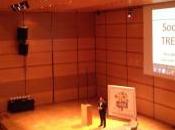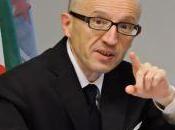 Questa era la terza volta che partecipavo al festival ed ero , dopo l'esperienza perugina dell'ijf, più lanciato che mai. Mi aspettavo grandi cose ma, devo essere sincero, a questo giro l'ho trovato (o almeno questa è la mia impressione) un poco raffazzonato. Ma con questo non voglio dire che siano stati tre giorni sprecati.
Questa era la terza volta che partecipavo al festival ed ero , dopo l'esperienza perugina dell'ijf, più lanciato che mai. Mi aspettavo grandi cose ma, devo essere sincero, a questo giro l'ho trovato (o almeno questa è la mia impressione) un poco raffazzonato. Ma con questo non voglio dire che siano stati tre giorni sprecati.I suoi momenti interessanti ci sono stati, e nonostante i disagi e i dubbi lasciati dalle ferite del sisma va comunque dato onore al merito di essere riusciti a portare tutto in porto. Ciò nonostante mi sono sentito in dovere di buttare giù (prendendo spunto da un must della testata) qualche regolina, o consiglio, di cui secondo me un evento di tale portata dovrebbe tenere conto, soprattutto considerando il tipo di argomento trattato e l'epoca che ci vede protagonisti.
Lo metto al plurale perché nell'era del mondo iper-connesso non è protagonista solo chi calca il palco ma pure il pubblico che costituisce elemento fondamentale e propaggine attiva dell'evento.
Lo amplifica, ne crea ulteriori snodi producendo contenuti collaterali che diventano elementi indispensabili alla narrazione dell'evento stesso. Sono quelli che poi escono dalla cornice coinvolgendo, avvolgendo.
Regole (da prendere come critiche costruttive):
- Non creare un hashtag simile a quello di un evento concomitante. Il rischio è di creare panico e confusione sulla timeline di twitter. Si deve parlare di te, non correre il rischio che per errore si parli di altri. (vedi #if2012 e #inf12)
- Come a qualunque festival il tuo account twitter ufficiale deve essere la guida, anche per chi non è presente ma comunque vuole esserci. Dovrebbe essere rapido nel dare appuntamenti, cambi programma, info puntuali sugli streaming e magari pure interagire con i tuoi follower, almeno in queste occasioni. Deve arrivare prima, non dopo.
- Accreditare venti twitteri (tra cui il sottoscritto) per permettergli di seguire più facilmente gli eventi e fare live twitting è stupendo. Denota apertura e visione del tempo che si vive. Bisognerebbe però coinvolgerli un poco di più e promuovere meglio l'esperimento, o la cosa rischia di andare in mano al caso.
- Fare, creare, community (che si sa è un'arma potentissima). Interagisci, dialoga. Affianca i tuoi contenuti a quelli creati dal tuo pubblico, valorizzali. Perché essi rappresentano l'altro 50% del totale. Sono l'espediente narrativo che rende umano il racconto, che permette l'identificazione in esso.
- Una tre giorni di incontri sparpagliati per la città è faticosa, anche in termini di batteria. Una colonnina qui e la per un pit-stop ricarica (magari sostenibile) è fondamentale nell'era dei device.
- Una copertura Wifi, soprattutto se gli eventi si svolgono in luoghi chiusi o contornati da mura medievali è fondamentale se vuoi che all'esterno si parli di te. Ma soprattutto, viene incontro a chi parla di te (anche in termini di risparmio, che si sa in tempi di crisi).
- Se organizzi un festival, un evento. ci sono sempre degli imprevisti (cit. Giovanni De Mauro), e lo dico per esperienza. Fai tesoro dei consigli e la prossima volta sarà un successo ancora più grande.
Photo credit: Emanuela Carabelli
Seven rules post #inf12 in a social network optic but not only
I spent the last weekend in Ferrara at the Internazionale Festival. Three days of meetings, debates, workshops and expositions dedicated to journalism and ways to do journalism. At the end of the event I decided to write some advice/rules for the organizers, especially from a social network point of view.
This was my third time at the Festival and was, after the Perugia experience with IJF, extremely excitet. I expected great things but, I must be honest, this time I found it put together without any care. But I don't mean it was a waste of three days.
It had some interesting moments, and in spite of the difficulties and doubts left behind by the earthquake we must give honor to the merit of managing to do everything as planned. However I felt the need to write down a few rules or advice, that an event so big should take into account, especially considering the type of topic that is dealt with and the era in which we live.
I said "we" because in the time of the hyperconnected world the protagonists aren't just those who step on the stage, but also the public that constitutes a fundamental element and active appendix of the event.
It amplifies it, it creates further opening by producing collateral content that becomes a fundamental element of the storytelling of the event itself. They are the ones that come out of the frame, that involve and engage.
Rules, to be read as constructive criticism:
- Don't create a hashtag that is similar to that of a concurring event. The risk is that you will create panic and confusion on the Twitter timeline. Users must talk about you, not risk talking about someone else by mistake. (see if2012 and inf12)
- As in any festival your official Twitter account must be the guide, also for those who aren't present but would like to be. It should be fast in announcing meetings, changes of program, information about the streaming and perhaps even interact with followers, at least in these occasions. It must arrive first, not last.
- Giving press accreditation to twenty Twitter users (among which myself), in order to allow them to follow more easily the events and doing live twitting is great. It shows a vision of the time that we're living. You should envolve them a bit more and promote the experiment better, or the whole thing risks to go into chaos.
- Doing, creating, building a community (which we know is a powerful weapon). Interact, speak. Put your content next to the content created by your audience, give them value. Because they represent the other half of the total. They're the narrative tool that makes the story human, that allows identification with it.
- Three days of meetings around the city is difficult, also in terms of battery life. A column here and there for a recharge pit-stop is fundamental in the era of mobile devices.
- A Wifi coverage, especially when the events are in closed areas or surrounded by medieval walls is fundamental if you want people to talk about you. But most of all, it gives a hand to those who talk about you (also in terms of saving money, in times of crisis like these are).
- If you organize a festival, an event, there are always some unpredictables (cit. Giovanni De Mauro), and I say that from my personal experience. Treasure the advice and next time it's going to be an even greater success.




